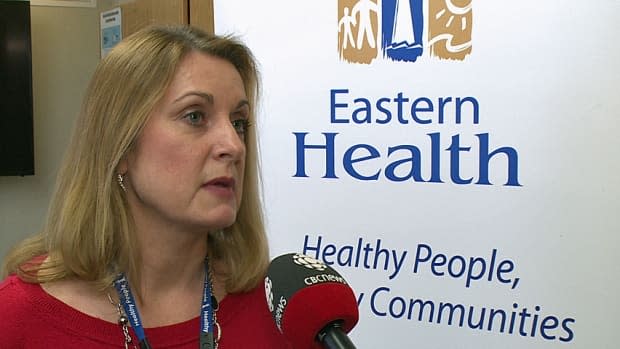Expect screening, mandatory masks as 'some normalcy' returns to hospital visitation
Patients will be able to see more friends and family with the easing of visitor restrictions in health-care facilities, but Eastern Health advises people there will be regulations in place to ensure safety and social distancing.
As of Monday, in-patients at hospitals, long-term-care homes, personal-care homes and assisted-living facilities across all provincial health authorities are allowed to list as many as six people to be allowed to visit them, with a maximum of two per day, per patient.
"So not all six at once," says Judy O'Keefe, vice-president of clinical services with Eastern Health.
"The reason for that is so we can maintain a lower level of volume of people in our buildings, so we can maintain physical distancing, but also importantly to ensure that we're able to screen those visitors."
Patients will be asked to provide staff with the two names of the visitors they expect each day. When those people show up at the door, they will be asked for identification before being screened for symptoms.
For staff it's positive as well because it's really better for patient care to be able to have them be supported by their family. - Judy O'Keefe
"[That way] we know they don't have any signs or symptoms of COVID or other illness and we can appropriately coach them on how to practise physical distancing and using hand hygiene and giving them a mask, et cetera," said O'Keefe, adding that visitors will be told to keep their masks on for the entire duration of their visit.
O'Keefe said they hope the two-visitors-per-day rule will expedite the screening process and cut down on wait times for visitors.
"You can come back and forth during the day and those two individuals would not have to be screened every time they come in. Once you're screened for the day and you're on the list, then you're considered done," said O'Keefe.
"So if you're coming in the morning and you plan to come back in the evening, as an example, then we would know that you've been screened and you understand all the requirements."
O'Keefe said Newfoundland and Labrador has been doing well with limiting the spread of COVID-19 and is in a "low-prevalence environment," with just one active case in the province as of Wednesday, which means restrictions can slowly change.
"And as well, we've recognized that our patients and our long-term-care residents really need to have their support people around them in order to help them get well," she said.
"That's the reason behind trying to move back to some normalcy around our visitation."
'We're managing it'
If a visitor presents with symptoms of the COVID-19 virus, they will not be permitted into the facility. Similarly, listed visitors who arrived in the province from outside the Atlantic bubble who have not yet completed their 14-day isolation will also not be allowed in.
Since not all patients are in private rooms, with some facilities housing as many as four patients in a room in some cases, there is some planning needed to ensure visitation spaces are available for a patient and their visitors.

O'Keefe said there may be a visiting area set aside on a floor of the facility, or a vacant room that can be made available for visitors.
"Generally speaking, we know when the visitor is coming, because we have the names of the visitors and the times that we expect them to come in, and when they present, they're screened and we know when they're coming up to the unit," O'Keefe said.
"So for people in wards or in semi-private rooms, it takes a little bit more coaching to ensure that we have the hours of their visitation correct. But we are managing it," she said, adding that some locations "may be able to be more liberal than others because they have more spaces available."
Depending on the facility where a patient is located, there may be stricter visitation times — or some patients who are still not able to have visitors, depending on their condition.
O'Keefe said things have been running smoothly since the changes came into effect Monday.
"Patients and residents are really happy to be able to expand their list, and for staff it's positive as well because it's really better for patient care to be able to have them be supported by their family members as they go through their health-care crisis," she said.
Read more from CBC Newfoundland and Labrador

